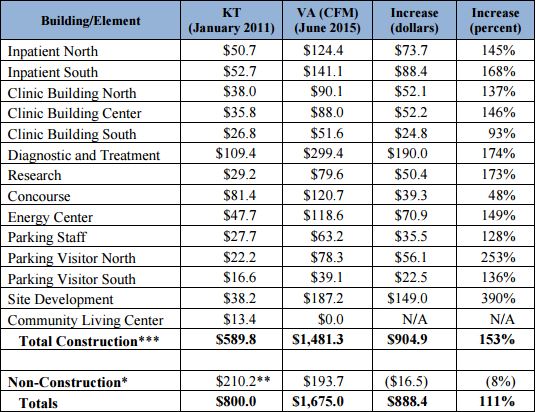
Indecision, poor leadership led to $888 million overruns on VA hospital, IG says
The House Veterans Affairs Committee wrote to the Justice Department, asking that DOJ investigate whether VA officials lied before Congress when they testified...
Amid a new inspector general report detailing leadership’s failures to control construction costs and scheduling overruns for a new Veterans Affairs hospital in Denver, several House lawmakers are asking the Justice Department to investigate whether VA officials lied to Congress.
House Veterans Affairs Committee Chairman Jeff Miller (R-Fla.) and Acting Ranking Member Mark Takano (D-Calif.), along with 19 other lawmakers, formally wrote to Attorney General Loretta Lynch asking that she open an investigation into statements Glenn Haggstrom, former executive director for the VA Office of Acquisition, Logistics and Construction, and Stella Fiortes, executive director of VA’s Office of Construction and Facilities Management, made before Congress.
“It is an absolute fact that numerous VA officials repeatedly misled Congress regarding cost overruns related to the replacement of the Denver VA medical center,” Miller said in a statement.
The committee says Haggstrom and other VA officials likely misrepresented or withheld information when they testified about the project back in 2013 and 2014.
The latest report from VA IG Michael Missal came down hard on senior leaders, who made bad business decisions and were inexperienced in using an integrated-design and construct contract.
The entire project is expected to cost $1.675 billion, more than double the $800 million Congress originally appropriated for the construction between 2004 and 2012. The original idea and concept to build a larger VA hospital for veterans in the Denver area dates back to the late 1990s.
Yet now, VA won’t complete the project until sometime in 2018, the IG said.
The project got off to a slow start because the concept, scope and design of the building changed under leadership from five VA secretaries, altering the cost estimates for the hospital throughout the entire project’s life cycle, the IG said.

According to the IG, the design and scope of the project spun out of control, and VA leaders ignored warnings of the rising costs and scheduling delays.
“Although other more conventional and potentially simpler-to-construct options were considered by VA, a more complex design was chosen, which had implications for cost, constructability and potential future expansion of the facility,” the IG wrote. “The design chosen consists of many narrow three-story buildings spread out on the Aurora site. Among other issues, in our opinion, it could potentially cause greater challenges for veterans, their families and other visitors to access various services across the campus compared with a compact, multi-storied building with elevators.”
The department failed to respond to several other warnings, the IG said.
“VA inadequately staffed the project in key areas, and VA senior staff did not respond to warnings that more staff was needed,” the inspector general said. “Two U.S. Army Corps of Engineers reports on the Denver project identified the need for more staffing, such as contracting and engineering staff for the project.”
At one point, VA projects managers left one certified contracting officer’s technical representative and a junior engineer available for the project.
The department also failed to properly manage their contractor, the Joint Venture Team. JVT designed the hospital beyond the scope of what veterans in the Denver area need, the IG said, and VA leaders did little to intervene.
“VA officials indicated the JVT was both difficult to work with and not cooperative in making necessary design changes to meet the budget,” the report said. “VA officials suggested that the JVT resisted the changes because, under the contract terms with VA, the JVT had a vested interest in not engaging in a large and potentially expensive redesign of the project.”
VA’s Administrative Investigation Board did its own review of the construction project, but it hasn’t been released to the public. The House VA Committee issued a subpoena earlier this month for that report.
Broader issues plague VA construction, acquisition
This comes as the same committee questioned VA’s overall procurement organization, which the Government Accountability Office described as confusing and overly complicated, earlier this week. Four offices within the department, each with several different locations, award contracts for VA.
“Companies doing business with VA don’t know what the rules are, and even the VA contracting officers get confused,” said Rep. Mike Coffman, chairman of the House VA Oversight and Investigations Subcommittee, at a Sept. 20 hearing.
The department also uses its own acquisition regulations and has two active versions of them, GAO found. One, which the VA said it recently rescinded, hadn’t been updated since 1987, and another dates back to 2008.
“I’ve never seen anything like that in my several decades of working at GAO,” Michele Mackin, director of acquisition and sourcing management, said Sept. 20. “I just have to attribute it to the lack of management attention, the lack of people looking out for what contracting officers need to do their job.”
Greg Giddens, who replaced Haggstrom as VA’s executive director for acquisition, logistics and construction, introduced in December five new procurement principles to inform the way the department should develop future contracts and manage projects.
But the committee said VA contracting officers are still following some policies that the department had previously canceled.
VA will release a request for comment on a draft version of its updated acquisition regulations in 2017, Giddens said.
Copyright © 2025 Federal News Network. All rights reserved. This website is not intended for users located within the European Economic Area.
Nicole Ogrysko is a reporter for Federal News Network focusing on the federal workforce and federal pay and benefits.
Follow @nogryskoWFED





